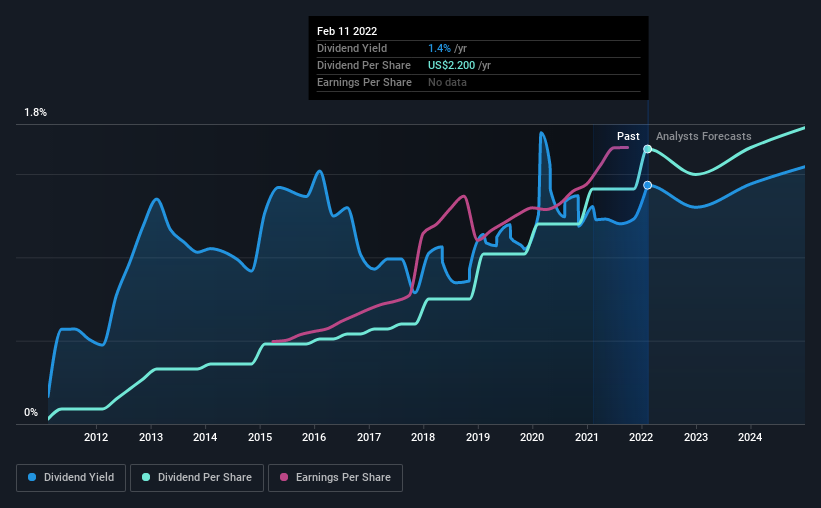Should You Buy Primerica, Inc. (NYSE:PRI) For Its Upcoming Dividend?
Regular readers will know that we love our dividends at Simply Wall St, which is why it's exciting to see Primerica, Inc. (NYSE:PRI) is about to trade ex-dividend in the next four days. The ex-dividend date occurs one day before the record date which is the day on which shareholders need to be on the company's books in order to receive a dividend. The ex-dividend date is of consequence because whenever a stock is bought or sold, the trade takes at least two business day to settle. In other words, investors can purchase Primerica's shares before the 18th of February in order to be eligible for the dividend, which will be paid on the 14th of March.
The company's next dividend payment will be US$0.55 per share, and in the last 12 months, the company paid a total of US$1.88 per share. Based on the last year's worth of payments, Primerica has a trailing yield of 1.4% on the current stock price of $153.54. Dividends are a major contributor to investment returns for long term holders, but only if the dividend continues to be paid. We need to see whether the dividend is covered by earnings and if it's growing.
See our latest analysis for Primerica
If a company pays out more in dividends than it earned, then the dividend might become unsustainable - hardly an ideal situation. Primerica paid out just 17% of its profit last year, which we think is conservatively low and leaves plenty of margin for unexpected circumstances.
When a company paid out less in dividends than it earned in profit, this generally suggests its dividend is affordable. The lower the % of its profit that it pays out, the greater the margin of safety for the dividend if the business enters a downturn.
Click here to see the company's payout ratio, plus analyst estimates of its future dividends.
Have Earnings And Dividends Been Growing?
Stocks in companies that generate sustainable earnings growth often make the best dividend prospects, as it is easier to lift the dividend when earnings are rising. If earnings fall far enough, the company could be forced to cut its dividend. That's why it's comforting to see Primerica's earnings have been skyrocketing, up 24% per annum for the past five years.
Another key way to measure a company's dividend prospects is by measuring its historical rate of dividend growth. Since the start of our data, 10 years ago, Primerica has lifted its dividend by approximately 49% a year on average. It's exciting to see that both earnings and dividends per share have grown rapidly over the past few years.
Final Takeaway
Is Primerica worth buying for its dividend? Companies like Primerica that are growing rapidly and paying out a low fraction of earnings, are usually reinvesting heavily in their business. Perhaps even more importantly - this can sometimes signal management is focused on the long term future of the business. We think this is a pretty attractive combination, and would be interested in investigating Primerica more closely.
On that note, you'll want to research what risks Primerica is facing. Case in point: We've spotted 2 warning signs for Primerica you should be aware of.
We wouldn't recommend just buying the first dividend stock you see, though. Here's a list of interesting dividend stocks with a greater than 2% yield and an upcoming dividend.
Have feedback on this article? Concerned about the content? Get in touch with us directly. Alternatively, email editorial-team (at) simplywallst.com.
This article by Simply Wall St is general in nature. We provide commentary based on historical data and analyst forecasts only using an unbiased methodology and our articles are not intended to be financial advice. It does not constitute a recommendation to buy or sell any stock, and does not take account of your objectives, or your financial situation. We aim to bring you long-term focused analysis driven by fundamental data. Note that our analysis may not factor in the latest price-sensitive company announcements or qualitative material. Simply Wall St has no position in any stocks mentioned.

